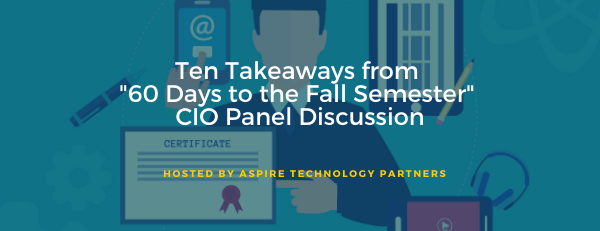Ten Takeaways from “60 Days to the Fall Semester” CIO Panel Discussion
Aspire Technology Partners, in partnership with Cisco, recently conducted a CIO panel discussion on Higher Education IT, with a focus on efforts to re-open campuses safely for students this fall.
Higher Education has seen massive disruption because of the global pandemic. News articles across the nation detail emerging student-led class-action lawsuits over tuition, the emergence of elite cyborg universities, financial uncertainties that universities face, and whether colleges will open at all this fall and what the experience will be for students, faculty, and staff.
The delivery of Higher Education has changed. For the Fall semester and beyond, Higher Ed leaders must address Higher Education in four core areas: transforming academics; securing students and their data; improving student services; modernizing IT.
A trio of CIOs participated in the panel discussion to share how they transformed academics after governors issued lockdown orders, how they securely connected students and their data, how they prioritized key technologies to sustain their institutions, and how they re-imagined the delivery of education.
Here are the top ten takeaways from the “60 Days to the Fall Semester” panel discussion:
- Prepare for a hybrid environment. Most colleges and universities are moving into the hybrid environment where 80% of students are remote and 20% will be taught in the classroom.
- Make sure business and education rooms are fully supported and ready to pivot to a hybrid environment. Partner with your trusted technology solutions provider to leverage their expertise.
- Innovate now and pivot. Consider a DevOps approach. The disruption is impacting economic scales, bringing recession, significant decreases in enrollment, and threatening operational continuity.
- Place priorities on technology solutions, such as hyper-converged infrastructure, VDI, collaboration, and security, that can help sustain your institution.
- The institutions made significant investments in technology that included hyper-converged networks, which saved the institutions from acquiring the next biggest investment of laptop/chrome purchases. The hyper-converged solution helped them connect students to the college network securely with little to no interruptions.
- Having VDI in the environment is a huge advantage for lab applications and quick access. Create as many VDI labs as you can, so students do not have to crowd together to access resources. Moving to portals via VDI elevates ramp-up time and reduces friction with other requirements.
- Contingency plans are must-haves. Prepare to have multiple options. These plans may work or may not, and there are no certainties until the days/weeks/months after re-opening. Be flexible to pivot at any given time. Continuity plans are great on paper until you do them and realize that the plan did not work.
- Training is critical for students, faculty, and staff, and it needs to be continuous and progressive.
- Proper marshaling of the technology acquisition process. Make careful assessments, and look hard at all technology purchases, to make sure the college or university has only the most critical solutions that the campus needs.
- Re-imagine how to deliver digital education and how to deliver differently and keep students and teams engaged.
- Include key people in the organization and keep them engaged in the process. Constant communication is key and should be delivered in various ways to get the information across.
- Simplify the approach. Constantly ground yourself and look for things that you already have and what can augment it. Improve scenarios while maintaining consistencies in virtual teaching and learning. Leverage analytics for baselining, close monitoring, contact tracing, screening, etc., for better planning and decision-making.
- Have available a support/help desk system for technical requirements, so students, teachers, and staff can focus on uninterrupted learning and teaching.
Our panelists for “60 Days to the Fall Semester” were:
- Sharyne Miller, Associate Vice Chancellor of IT & CIO at the University of North Carolina Wilmington
- Dr. Milos Topic, VP & CIO, IT & Operations at Saint Peter’s University
- Ron Spaide, CIO at Bergen Community College
- Neal Tilley, Cisco Education Adviser, Business Development Manager
The CIO panel will reconvene sometime in early October 2020. Our panelists will share their experiences and learnings during the Fall semester.
For inquiries, or if you need assistance in your preparations for reopening or innovation initiatives, please contact Education@AspireTransforms.com or call 732-847-9600


